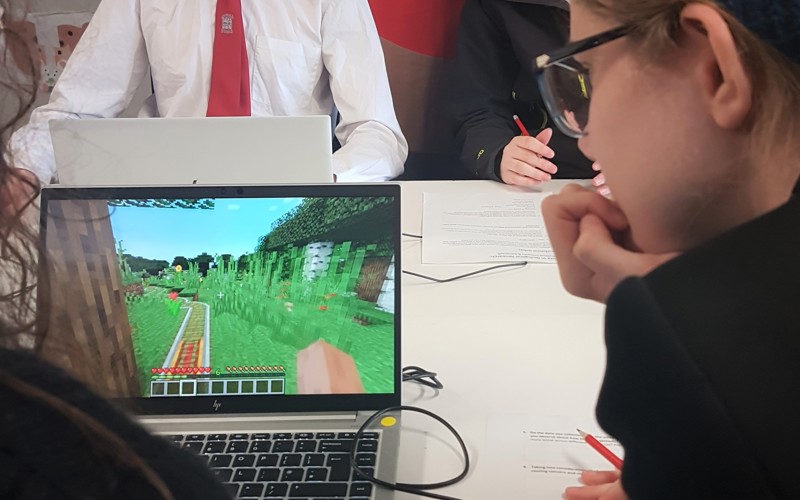
Reflections from our inaugural Public Engagement Fund
Public Engagement Manager, Katie Oldfield, reflects on our 2022-23 Public Engagement Fund and the impact of the projects it has supported.
Katie Oldfield
11 Mar 2024

Maria Fanourgiaki
20 Mar 2024
Supported by the RDS Public Engagement Fund, 'Data in Biological Research’ used Minecraft to encourage young people to explore how large-scale data can inform policy. Learn more in this guest blog by project lead, Maria Fanourgiaki.
Picture this: a mystery illness is spreading globally, prompting school closures and lockdowns. Cases are confirmed in cities worldwide, and public health authorities strain to cope with the fast-spreading virus. A scientific race to halt the pandemic intensifies.
Does this sound familiar?
Now imagine investigating this virus outbreak, gathering data to unravel the genetic code of the virus, understanding how it spreads, what symptoms it causes and who it mostly infects, all within the virtual world of Minecraft! Does it sound exciting? Well, hold on to your gaming gear and explore five Scottish locations: Edinburgh, Glasgow, Kirkcaldy, Dundee and Inverness. Assume the role of a field scientist dispatched to one of those places to gather DNA samples and vital information about symptoms and demographics.
During a train ride back from delivering a school workshop, the idea for this game-based project sparked after a lively conversation with Kate (PhD student) and Richard (Bioinformatics Education Officer, Curriculum developer). Together with three others from the University of Edinburgh’s School of Biological Sciences, we teamed up to engage diverse audiences, primarily youth, with infectious diseases and health data.
“The work we do in our lab requires quite a lot of data both from the virus and from the host. We’ve all been the source of that data throughout the coronavirus pandemic, when people got swabbed and tested, and that data then got analysed. What is poorly understood is how that data is collected and what people do with that data.”
The RDS Public Engagement Fund supported us in developing and piloting this project, and allowed us to build to strong partnership with Science Skills Academy in the Highlands.
In the wake of the recent pandemic experience and at a time when misinformation about public health data collection and usage is increasingly common, trust between local communities and science is much needed. Our goals were to encourage discussions and critical thinking that can empower young people to make informed decisions about health data. We also aimed to engage with communities we don’t usually interact with in more than a one-off way to bridge the gap in ‘Science Capital’ between Scotland’s central belt and the Highlands.
The project’s first phase involved delivering eight workshops to secondary schools in Fife (STEM Futures Festival) and on campus in Edinburgh, in June 2023. Teachers and students from National 5 to Advanced Higher Biology, were introduced to public health challenges through a Minecraft game developed by Perrin Grant (a final year student at the time), accompanied by discussion-based activities and crocheted coronavirus models, made by Kate with a little help from her friends.
The school workshops allowed us to test the game and collect feedback. Students were immediately hooked with Minecraft, gathering and analysing data, and asking questions about different virus variants. We were pleased to hear that students felt the game helped them understand more about real world virus outbreaks, and that teachers noted increased engagement among students “who can lack a bit of motivation”.
But our journey didn’t stop there. In July, we took the project beyond classrooms into the heart of the Highlands. And since no journey is without hiccups, we experienced some on the way to a festival in the Highlands: five of us including Emma from Science Skills Academy whom we had just met in person, crammed into a car for nearly four hours, stuck in unprecedented traffic on our way to a festival with limited water and food supplies. What could have been awkward turned into a highlight - a funny experience which helped us bond as a team for the busy days ahead!
From the Belladrum Tartan Heart Music Festival to the Newton Rooms in Dingwall and Inverness, we engaged with over 1000 people of various ages, sparking conversations about real-world health challenges.
“By working together, we could offer our communities new and exciting workshops […] This allowed us to bridge our learners and communities with cutting edge research, which they don't often get the chance to engage with in the Highlands.”
The seeds of this pilot project are sprouting new science engagement opportunities for young people in the Highlands and beyond, and we are already working on another project with Science Skills Academy. Our Minecraft workshop is also reaching more schools and community youth groups, supporting skills development objectives.
Reflecting on this project, I’m grateful for the opportunity to bring together a diverse team to inspire young minds and foster critical thinking. We brought public health data to life in the pixelated landscapes of Minecraft, turning a simple idea into a celebration of community engagement and partnership. I hope for more initiatives like this to emerge soon supporting community engagement with data in the long-term.
School of Biological Sciences, University of Edinburgh
Project Lead: Maria Fanourgiaki, Public Engagement Officer
Infectious Disease Modeller-Minecraft game developer: Perrin Grant, final year student at the time
Minecraft game development support: Richard Fitzpatrick, Curriculum Developer and Bioinformatics Education Officer
Researcher: Kate Duggan, PhD student
Support and critical eyes: Janet Paterson, Public Engagement Manager. Daniel Barker, Reader
Partner: Science Skills Academy
Lead: Emma Plato, STEM Engagement Manager
Related content

Public Engagement Manager, Katie Oldfield, reflects on our 2022-23 Public Engagement Fund and the impact of the projects it has supported.
Katie Oldfield
11 Mar 2024

In 2023, Research Data Scotland (RDS) awarded over £56,000 to promote public engagement and involvement in data research in Scotland. In a recent showcase, the projects reflected on their work to date.
Research Data Scotland
11 Mar 2024
To stay updated with Research Data Scotland, subscribe to our mailing list and follow us on X (Twitter) and LinkedIn.
